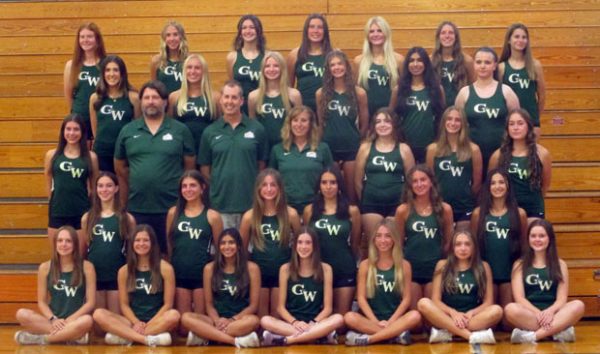Complete Coverage of Figure Skating at the Olympics
This year at the Olympics, the figure skating programs were full of exciting twists and turns. From the history that was made on the ice to the intense skating rivalries, there was plenty of suspense that kept viewers at the edge of their seats and dazzled by the performances.
In the Individual Women’s skating program, including both the results from the Short Program and the Free Skate, two Olympic athletes from Russia, Alina Zagitova and Evgenia Medvedeva placed, winning gold and silver. The performances of both these skaters left the audience in awe. In the Short Program, both of these skaters earned 156.65, leaving them with an even start for the Free Skate. Zagitova has exceptional technical skills, whereas Medvedeva has inspiring artistic abilities in addition to her technical skills. The strengths of these two Russian skaters initiated a large discussion. Many individuals believed that Medvedeva actually had an upper hand and should have earned the gold medal due to the artistic component of her performance. Trained by the same coach, Medvedeva is on the same level as Zagitova in terms of the technical component. However, Medvedeva does have incomparable artistic abilities. This gave Medvedeva leverage on Zagitova. Unfortunately, it was not enough. Because Zagitova saved most of her jumps for the second half of her performance, giving her a 10% bonus on every jump, she earned more points than Medvedeva. This implementation of the 10% bonus rule in skating has sparked some controversy. Instead of encouraging skaters to display emotion, tell a story, and reveal beauty – the epitome of ice skating – it teaches them to become point grabbers, earning points in the most ways possible, even if it affects the impact of the whole performance.
Landing in third was Canada’s Kaetlyn Osmond with a stunning performance of the Black Swan. Osmond was a pure joy to watch on the ice as the crowd seemed to be enjoying the performance as well. The three skaters from the United States, Bradie Tennell, Mirai Nagasu, and Karen Chen, finished ninth, tenth, and eleventh. These skaters were supposed to have a better fate in the Olympics but, sadly, they cracked under pressure.
In the Individual Men’s skating program, covering both the results from the Short Program and the Free Skate, two skaters from Japan, Yuzuru Hanyu and Shoma Uno, placed first and second with their outstanding performances. Hanyu decided to play it safe during the Olympics by not attempting a quadruple loop on his injured ankle. However, he expressed his intention to challenge himself by trying an unprecedented quadruple axel, and even a quintuple going forward. This ultimately has a large payoff. Uno, unfortunately, missed his quad flip during the program. Luckily, Uno stayed calm and finished the program nicely.
Finishing in third was Javier Fernández from Spain. The United States skaters, Nathan Chen, Vincent Zhou, and Adam Rippon, had solid performances, landing the spots of fifth, sixth, and tenth. After his miserable performance in the Short Program, partially due to the injury he suffered from recently, Chen approached the rest of the competition with a carefree attitude in the Free Skate. With this shift in mindset, Chen was able to position himself in fifth. Rippon, a fan favorite, had a decent performance. Although many believe Rippon’s lack of quad jumps was detrimental, he proved them wrong and landed in seventh in the Short Program. Sadly, he let himself down in the Free Skate where he earned tenth in both that event and overall.
In the Team Mixed skating program, the skaters from Canada had incredible performances that enabled their country to earn gold. Olympic Athletes from Russia and the skaters from the United States, landed the silver and bronze medal with their exceptional performances. History was made at this event when Mirai Nagasu, a female skater from the United States, was the third woman to land the triple axel at the Olympics and the first American. Nagasu personally requested that her coach teach her the triple axel jump, the most challenging move that female skaters can skate. She knew that to set herself apart from her competition, she needed a stunning trick like the triple axel. Despite her revolutionary performance at the team event, Nagasu was not able to have the same effect on her audience for the Individual’s Woman skating program.
In the Pairs Short Program, the skaters from Germany, Bruno Massot and Aliona Savchenko, earned themselves a gold medal by a hair. The German pair scored a world-record 159.31 in the free skate and, combined with their fourth place finish in the short program, that score allowed them to assume the top spot on the podium. Tailing behind the pair, the Chinese skaters, Sui Wenjing and Han Cong, placed second, missing the gold medal by 0.43 points. Both teams had exceptional and comparable performances.
Landing a silver medal, Meagan Duhamel and Eric Radford from Canada skated their way to victory. Unlike this pair, the American skaters, Chris Knierim and Alexa Scimeca Knierim, a husband and wife duo, did not have as much luck. Their final run was maimed by several mistakes, such as Chris’ fall on a side-by-side jump. Fortunately, the two did make history when they became the first American pair to ever land a quad twist at the Olympics. This caused the Americans to finish 14th in the short program and score a 120.27 in the free skate to land in 15th in the overall standings.
In the Ice Dance skating program, including both the results from the Short Program and the Free Dance, Tessa Virtue and Scott Moir of Canada won the gold medal in the last competitive skate of their careers. Tessa Virtue and Scott Moir skated a groundbreaking performance that was sharp, synchronized, and graceful. Right behind this gorgeous pair, Gabriella Papadakis and Guillaume Cizeron of France earned the silver medal. Despite their wardrobe malfunction, the French team actually set a free dance world record and total score world record, while Canada broke the latter but not the former.
Unlike the past ice skating events the United States participated in, the Ice Dance was successful as the siblings, Maia and Alex Shibutani, more commonly known as the “Shib Sibs,” earned a silver medal. Their vibrant costumes and exciting music was a crowd favorite as they skated seamlessly across the ice with impeccable grace.

Michelle is the Co-Editor-in-Chief of the Glen Bard. She is currently a senior and is excited to be part of the Glen Bard staff. Her passions include reading,...









